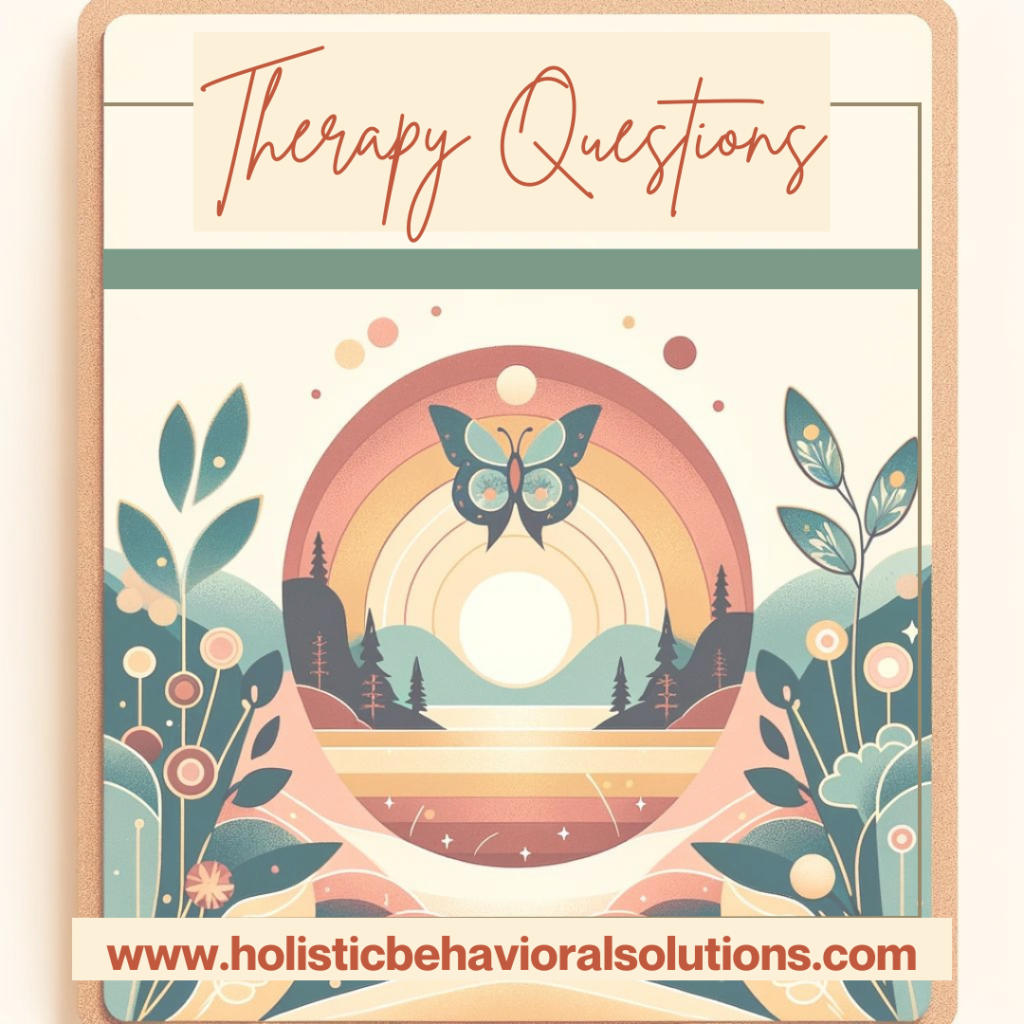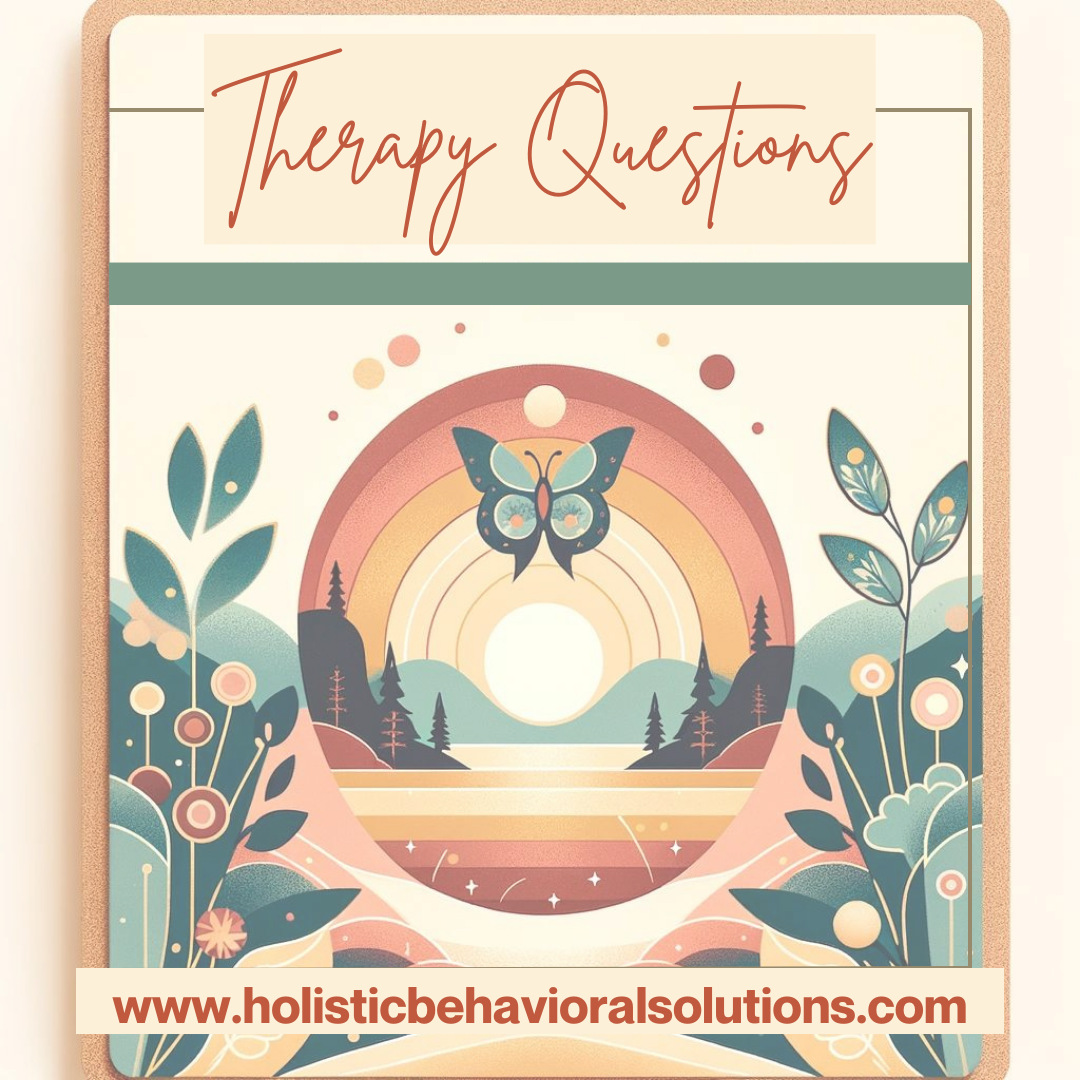Questions for Holistic Behavioral Solutions?
Adapted from The American Counseling Association http://www.counseling.org/
When should I see a Therapist/ Counselor?
From childhood through late adulthood, there are certain times when we may need help addressing problems and issues that cause us emotional distress or make us feel overwhelmed. When you are experiencing these types of difficulties, you may benefit from the assistance of an experienced, trained professional. We all have questions; let us get a few answers.
Professional counselors offer the caring, expert assistance we often need during these stressful times. A counselor can help you identify your problems, answer your questions and assist you in finding the best ways to cope with the situation by changing behaviors that contribute to the problem or by finding constructive ways to deal with a situation beyond your control. Professional counselors offer help in addressing many situations that cause emotional stress, including, but not limited to:
- anxiety, depression, and other mental and emotional problems and disorders
- family and relationship issues
- substance abuse and other addictions
- sexual abuse and domestic violence
- eating disorders
- career change and job stress
- social and emotional difficulties related to disability and illness
- adopting to life transitions, including a new birth or growing children
- the death of a loved one
“Good indicators of when you should seek counseling are when you’re having difficulties at work, your ability to concentrate is diminished, or when your level of pain becomes uncomfortable,” says Dr. Gail Robinson, past president of the American Counseling Association. “However, you don’t want to wait until the pain becomes unbearable or you’re at the end of your rope.”
Joyce Breasure, past president of the American Counseling Association and a professional counselor who has been in private practice for more than 20 years, recommends counseling when you:
- Spend 5 out of 7 days feeling unhappy.
- Regularly cannot sleep at night.
- Are you taking care of a parent or a child, and the idea crosses your mind that you may want to hit that person?
- Place an elder in a nursing home or in alternative care
- Have lost someone or something (such as a job)
- Have a chronic or acute medical illness
- Can no longer prioritize what is most important in your life
- Feel that you can no longer manage your stress
“If you’re not playing some, working some, and learning some, then you’re out of balance. There’s a potential for some problems,” Breasure says.
Robinson points out you don’t have to be “sick” to benefit from counseling. “Counseling is more than a treatment of mental illness,” she says. “Some difficult issues we face in life are part of normal development. Sometimes, it’s helpful to see what you’re going through is quite normal.”
What is Professional Counseling?
Professional counselors work with individuals, families, groups, and organizations. Counseling is a collaborative effort between the counselor and the client. Professional counselors help clients identify goals and potential solutions to problems that cause emotional turmoil, seek to improve communication and coping skills, strengthen self-esteem, and promote behavior change and optimal mental health. Through counseling, you examine the behaviors, thoughts, and feelings that are causing difficulties in your life. You learn effective ways to deal with your problems by building upon personal strengths. A professional counselor will encourage your personal growth and development in ways that foster your interest and welfare.

Who are Professional Counselors?
Licensed professional counselors provide quality mental health and substance abuse care to millions of Americans. Professional counselors have a master’s or doctoral degree in counseling or a related field, which includes an internship and coursework in human behavior and development, effective counseling strategies, ethical practice, and other core knowledge areas.
Over 80,000 professional counselors are licensed in 48 states as well as the District of Columbia. State licensure typically requires a master’s or doctoral degree, two to three years of supervised clinical experience, and the passage of an examination. @ Holistic Behavioral Solutions, all clinicians have a minimum of 10 years of post-graduate work. Participation in continuing education is REQUIRED for the renewal of a NJ license. The average hours of continuing ed at HBS is more than four times the national average per year.
Professional counselors adhere to a code of ethics that protects the confidentiality of the counseling relationship, prohibits discrimination, requires understanding of and respect for diverse cultural backgrounds, and mandates that professional counselors put the needs and welfare of clients before all others in their practice.
Will my Health Insurance Cover Counseling?
Many insurance and coverage plans cover mental health services by an LPC or LCSW, including some Medicaid programs. It is the policy of HBS that confidentiality and trust is key, we are an out of network provider and are happy to give you a bill for you to submit to insurance. Many of my patients are reimbursed up to 80% of the office fee. We believe that when YOU control your health info and not an insurance company, you can make better decisions for your future. We have a sliding scale and are happy to make accommodations when necessary to ensure continuity of care.
Another Question: How Long Does Counseling Take?
Ideally, counseling is terminated when the problem that you pursued counseling for becomes more manageable or is resolved. However, some insurance companies and managed care plans may limit the number of sessions for which they pay. You should check with your health plan to find out more about any limitations in your coverage.
During the first few counseling sessions, your counselor should also discuss the length of treatment that may be needed to achieve your goals. HBS is solution-focused and provides custom care; some clients need only one session, and others find that they need a longer time to practice and integrate their newly acquired skills into their lives. We will discuss this in the office and make a decision that is best for you.
Is Everything I Say Confidential?
All members of the American Counseling Association subscribe to the Code of Ethics and Standards of Practice, which require counselors to protect the confidentiality of their communications with clients. Most state licensure laws also protect client confidentiality. As a client, you are guaranteed the protection of confidentiality within the boundaries of the client/counselor relationship.
Any disclosure will be made with your full written, informed consent and will be limited to a specific period of time. The only limitations to confidentiality occur when a counselor feels that there is a clear and imminent danger to you or to others or when legal requirements demand that confidential information be disclosed, such as a court case. Whenever possible, you will be informed before confidential information is revealed.
How Long is a Counseling Session?
That depends; @ Holistic Behavioral Solutions, we have group sessions that last 60 minutes, individual and family sessions that last 50 minutes (a clinical hour), and intensive start-up sessions that last 90 minutes. We also have abbreviated sessions at a reduced rate. Clients are usually seen weekly. However, there are individuals that are seen twice weekly based on their needs. Cancellations require 24-hour notice as stated in the office policies.
